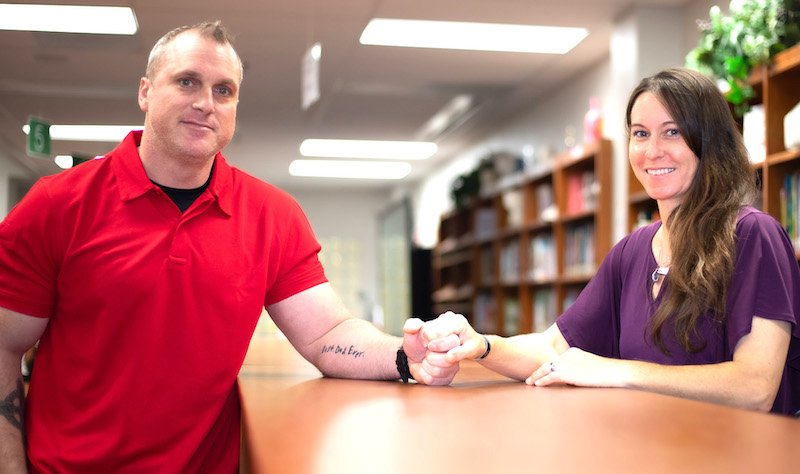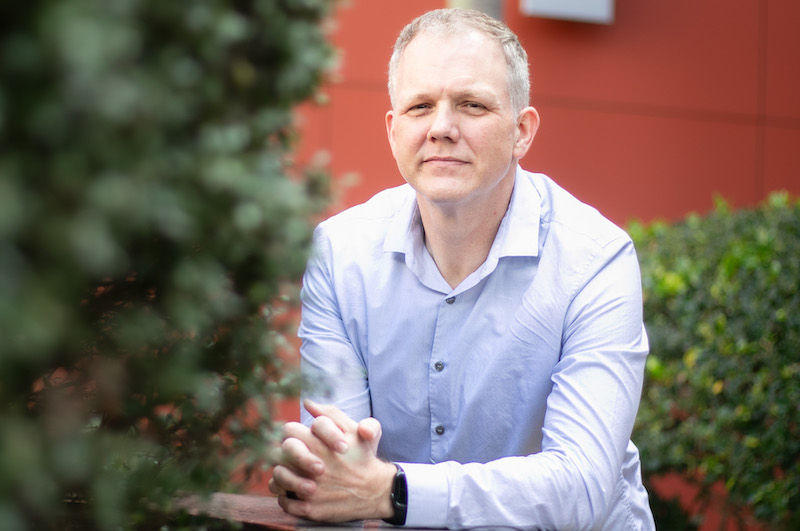MEDICAL SPOTLIGHT

‘We think positively’ in the face of infertility, says Health First’s Dr. Scott Bovelsky.
BREVARD COUNTY, FLORIDA – When Brevard County Sheriff’s Cpl. Tonya Chaney arrived last spring at the Health First Medical Group-Gateway practice of Gynecologist M. Scott Bovelsky, MD, she was frustrated.
She wanted another baby. It wasn’t happening, and there was no cause to believe she couldn’t conceive. She has three sons, but her youngest was born 14 years ago, when she was in her 20s.
“I’m 42 now,” she said earlier this month, “and I want a girl.”
Chaney loves kids. That’s one reason she’s happy in her law enforcement role as a school resource officer in West Melbourne. She has seriously considered both fostering and adoption. When she met a partner who was on board with conceiving a child, it was a no-brainer.
So why wasn’t it happening as readily as it had before?
A Gynecologist is Your First Call
Many couples trying to get pregnant don’t. Experts know that pregnancy isn’t a likely outcome in any given month even for unchallenged couples, but about 1 in 8 have fertility complications requiring medical intervention.
The scientific designation of infertility is trying and failing to conceive after one calendar year. For women 35 and older, providers may begin examining infertility causes after six months.
The reasons for infertility in women are many, including infrequent or absent eggs, blocked fallopian tubes, and the shape or condition of a uterus that prevents a fertilized egg from attaching. For men, the reasons could be too few or inactive sperm, or the seminal fluid itself.
Blame is often misplaced. Research suggests male-factor infertility is nearly as common as female causes. Dr. Bovelsky says a woman’s gynecologist should be couples’ first resource. He often refers men to a urologist for evaluation. A first-phase evaluation may include a semen analysis, a tubal evaluation, and ovarian reserve testing.

‘A Thorough Examination Is Important’
The most common problem he uncovers is the woman is not ovulating, and to evaluate that, there are ovulation predictor kits, but “a lot of times we have two problems at once – getting a thorough evaluation is important.”
According to the CDC, drugs and surgery address most cases of infertility. Dr. Bovelsky says the toughest of challenges is blocked fallopian tubes. The solution may be surgical, but increasingly, it’s in vitro fertilization (IVF), in which an ovum (egg) is extracted by needle, fertilized in a lab, and implanted in the uterus. Each of these attempts can add up financially.
Chaney says, in her case, Dr. Bovelsky performed a sonohystogram that revealed an unusual growth in the endometrial lining of her uterus preventing a fertilized egg from implanting. A dilation and curettage (D&C) procedure gave her a fresh start, and just before Christmas, she was thrilled to tell her partner, their friends and family that she was pregnant.
Parenting Later
More and more American families are starting or welcoming additions later in women’s reproductive years. Chaney says she’s considered the arguments others might make against her decision to try for a baby at 42, but she’s following her heart.
“I never wanted to be this age having kids! I wanted to have a bunch of kids in my 20s and be done. Unfortunately, life happens. I couldn’t find a suitable partner.”
She bristles as she imagines any woman being told, maybe it wasn’t meant to be.
“No! Fight for yourself. Get the fertility treatments if that’s what it takes. Spend the money – what else do you have [to buy]?” – she shakes her head – “What do you have to gain? Your whole heart fills up.”
Dr. Bovelsky says that in his practice positivity counts. The first thing he acknowledges is that struggling to conceive and the stress couples’ feel is itself normal.
“People who come in have been trying for a while, and they see everyone else getting pregnant but them. We set expectations here, but we think positively, too.”
The National Infertility Association is a resource for information about infertility and help with it. If you would like to speak to a specialist at Health First about evaluating your fertility, visit HF.org, or call 321.434.3131.
To see more news coverage of Health First, visit HF.org/news.
The post Health First Gynecologist Dr. Scott Bovelsky Helps Space Coast Families Grow appeared first on Space Coast Daily.
